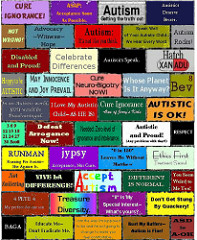BayDisability has begun blogging about prosopagnosia, and how it affects her life. Because hers is an acquired case, it has affected her profoundly. (Amazingly, it’s not some strange story she came up with to create “lesbian drama”! Oy.)
I have to say that from the self-reports I’ve read, faceblindness due to injury is much more disabling than the developmental (genetic) sort, such as I have. I think this is probably due to the fact that for those of us who have always been this way, our brains have adapted to using auxiliary clues from the start.
We don’t know any other way of identifying people than through their overall physical shape, gait, voice, hair style, mannerisms, and favorite articles of clothing. We do however, spend our lives in a perpetual state of background free-floating anxiety due to either not knowing why we have problems, or being aware of our problems and then trying to consciously apply what coping methods we can.
This is not to say that despite our limited coping abilities, we don’t have the typical long litanies of embarrassing moments of not recognising people, of mis-recognising people (thinking a person is someone else), of “twinning” two similar people into one, of “losing” familiar people (even family members!) in crowds, of misunderstanding movie plots, of being totally clueless about celebrities, of being stressed to the gills with learning new job tasks as well as trying to reliably identify a couple of key people, of …
However, the person who acquires prosopagnosia has a much harder time with the socially disabling aspects. And with faceblindness, it’s all socially disabling, and the “social model of disability” is apparent to a degree that warrants billboard-size attention. The “social model of disability” refers to how the way other people relate to you socially and physically due to how they perceive disabled people, and how the disability is created or magnified just because of the way things are artificially set up. In an oft-cited example, stairs are physically disabling, but ramps much less so. People who refuse to even acknowledge your presence or who ridicule or abuse or take advantage of you because you are the “Other” are engaging in social disablement.
Most disabilities have some intrinsically disabling factor that prevent you from doing things at all, from doing them easily, from doing them consistently, and/or from doing them in a manner that is reasonably typical. (Many disabilities are not total, nor even consistent in their effects from one hour or day to the other.) But when I’m alone, the fact that I’m faceblind is totally irrelevant. It has no bearing on my ability to garden, do domestic chores, my personal bookkeeping, drive a vehicle, write, or do any of my hobbies. Essentially, I have no disability; *poof!* It’s disappeared. There’s no way to tell that I have any neurological glitches in facial recognition. (If I see a dirty face in a mirror, I can safely assume that’s me with schmutz on my cheek.)
It’s only when I try to interact with other humans* that I am disabled. This is true even if that interaction is the one-way passive sort of watching recorded video. The few television shows I watch have morphologically distinct people, e.g. the various Star Treks. But there are still episodes where I get lost; for example, if the CSI agents are wearing HazMat suits with nothing but their faces or eyes showing through masks, then I am stuck trying to identify people by their voices, or am bugging my house-mates,
“Who’s that? Wait, that isn’t Warrick?”
“No, that’s Doc Robbins already!”
“Oh, yeah, Warrick is brown.”
“Shhh!”
In addition to the lack of lifelong adaptation, the person who acquires prosopagnosia has a much harder time because they are acutely aware of what they are missing, and are suffering not only the sense of loss, but also the abrupt, full-frontal immersion into the world of social disability and of trying to explain that faux pas are due to an invisible handicap that no one’s heard of.
Additionally, the person who acquires prosopagnosia has a much harder time because they are trying to force their brains to “rewire circuits” to re-invent previous skills, and find that not only is there no recognition, but that all identification is conscious, slow, problematic, and prone to much error. It’s also damn exhausting.
In contrast, those who are born faceblind have varying levels of weakness.
We may or may not be impaired in recognising emotions, or may easily identify broad emotions but miss the subtleties. I can generally tell how people are feeling, but fail to see much differences in the “emotions in the eyes” pictures, beyond surprised, sidelong glances, and squinting.
We may additionally have topographical agnosia (lost in place), or excel at way-finding.
We may be somewhat adept at identifying small numbers of regularly-met people, especially if they are in their expected locations.
We may be able to identify photographs of familiar people, but only if we remember the events.
We may be able to identify a few famous people by distinctive features, or from having memorized the inkblot-like patterns of commonly-used stock photographs.
Given such common (yet modest) successes, it’s easy to go through life thinking that the remaining omissions and mistakes are typical for others; after all, everyone complains of “being bad at names and faces”. It’s hard to realise just how much we’re missing, until a family member is waving one down from a restaurant table just ten feet away.
But then again, no matter what the level of impairment, we’re all still isolated by not being able to easily build up friendships (much less keeping track of potential dates), by failing to remember anyone from one interview or networking event to the next, and by not knowing anyone outside of the immediate group at the company or school.
In a pocket of my purse I have several name badges, for each of my different jobs. They all have the same name, and one has a photograph of someone wearing clothes and glasses like mine, whom I assume is me. I love name badges, and wear mine regularly, in an easily-read location near my head. I wish everyone wore them! So does BayDisability, in her latest post of helpful social tips. Go check out this great new blog.
* I have no trouble identifying the feline “people” in my life — they all look quite different! If only the humans wore the same, distinctive pelts every day …








mccurrysj said,
5 May 2015 at 16:05
I’m another head injury case, and it’s sort of like having the ground shift underneath you. It turns out that the identities of the people around us are a major part of defining the environment, and losing that is incredibly disorienting.
The advantage of not being born with it is that I can recognize emotions without difficulty. Furthermore, the twinning I experience is not like that which you describe. Because things used to be different, my default assumption is that when I don’t recognize people, they are strangers. I discovered this semester that what I thought was three different people was really one person in three of my classes. This has happened with approximately five people that I am aware of. It will be interesting to see if, as I adjust to the problem, my twinning will start to resemble yours.
Thank you for blogging about this, it’s been very helpful.
Erin Teller said,
19 April 2009 at 23:50
Thanks a million for noticing my blog and for writing so well about social disability. You are very smart and you really inspired me. I wrote a followup piece here:
http://baydisability.blogspot.com/2009/04/on-social-disability-power-and.html
For me, I have this head injury, and so I actually can get confused all by myself. It happens during activities I find complex: while I’m sorting my bills, or my socks, or I might even walk away from the table in the middle of eating because I got distracted by something. I might goof up how much advil I’ve taken when I get a headache, or I might not remember what I’ve planned to do, even though I tried to remind myself with a calendar. I might forget what I’m reading, forget where I put something, forget that I have someone’s phone number, and I never seem to know what time it is. All this stuff is pretty ongoing.
But with prosopagnosia, yeah, that really takes another person, doesn’t it. So that is a str8 up social disability, you’re right about that. I would love it if others could maybe be more helpful and at least recognize that their help would be abling. Is abling a word? Let’s make it one!
Thanks again for writing such a fabulous piece.
ET
Bug Girl said,
2 April 2009 at 14:16
Once again, you do an awesome job explaining some of what I experience daily.
THANKS!
Greg said,
1 April 2009 at 12:39
It must be very frustrating, being a quadriplegic in a power chair with a service dog makes me extremely visible as a person with a disability. We all develop coping mechanisms to fit our own needs, thanks for posting this!
Maddy said,
1 April 2009 at 3:35
I had to click across as I wasn’t familiar [had never heard of] that term. At least it gives me a further excuse to always dress in similar attire. I used to have to wear jeans and a white T-shirt for fear of being unrecognizable, these days it’s optional.
Cheers
Catana said,
1 April 2009 at 3:22
I’ve often wondered about seeing emotions in the eyes. I came to the conclusion that people are actually identifying emotions by the changes in the musculature around the eyes, and not the eyes themselves. Saying that someone’s eyes showed a particular emotion is just shorthand for the whole ball of wax (or maybe overactive imaginations). Or is this just another danged disability connected with my mild face blindness? It keeps getting harder to keep track of what’s normal and what’s just me.